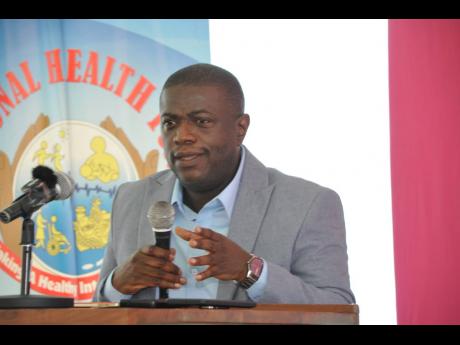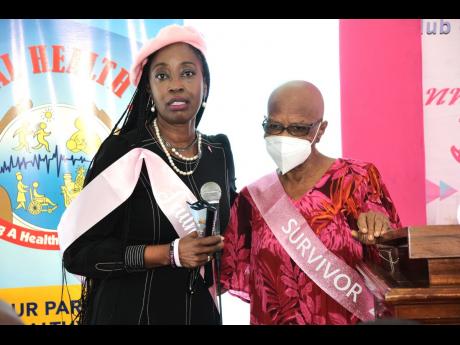Breast cancer alarm
With rising number of new breast cancer cases, NHF calls for national prioritisation for screening
WESTERN BUREAU:
Alarming statistics outlined by the executive director of the National Health Fund (NHF), Everton Anderson, show that some 7,500 new cancer cases were reported in 2022 in Jamaica, with 1,327 of these being breast cancer.
Anderson, who was speaking at the launch of the Kiwanis Club of Providence, Breast Cancer Run at the Sea Gardens Hotel in Montego Bay yesterday, highlighted the Global Cancer Observatory report, stating that these numbers are concerning and underscore the urgent need for improved early detection and treatment.
The 2022 data indicates an increasing prevalence of the disease as, in 2020, there were 1,208 new breast cancer cases diagnosed, up from 974 cases diagnosed in 2018. The Global Cancer Observatory reports are released every two years.
“The burden of this disease is immense not just in terms of human suffering, but also in the economic costs associated with treatment,” he emphasised, revealing that a single case could cost between $3 million and $25 million, with some cases exceeding $30 million.
The economic burden of cancer on the NHF is equally staggering as, Anderson noted, the Fund spends a significant portion of its budget on drugs to help fight the disease. “From a budget of $10 billion, we are spending $1.3 billion on cancer drugs alone. This illustrates the severe impact of cancer on our healthcare system.”
Introduced in 2003, the NHF card has been instrumental in alleviating some of the financial pressures associated with cancer care. Initially covering 13 conditions, the card now supports 22, including breast cancer.
“Breast cancer and prostate cancer have been on the card from day one, and the coverage for these conditions is about 70 per cent of the cost. Recently, we’ve also added colorectal cancer, lung cancer, and multiple myeloma,” Anderson said.
The NHF card has seen substantial enrolment, with 36,000 persons registered for cancer-related conditions as of August 1, 2024. Of these, 32 per cent are breast cancer patients.
“Each time a breast cancer patient swipes their NHF card at the pharmacy, we are spending an average of $12,000. This reflects our commitment to supporting those battling this disease,” Anderson stated.
A major point Anderson stressed was the importance of early detection. He cited a PubMed article by LP Garvey that found significantly higher costs for late-stage cancer patients. The NHF is committed to promoting early detection through various programmes as early intervention not only improves survival rates, but also reduces healthcare costs, he stated.
SCREENING DAYS NECESSARY
Tagging the situation deserving of a call for national prioritisation of screening, Anderson suggested that organisations across the country, including schools and businesses, dedicate screening days to ensure better health outcomes. This, he argued, would not only improve productivity, but also foster a culture of preventive care.
He noted that despite the availability of resources, there is still a significant fear of screening among Jamaicans.
“Many people avoid mammograms due to myths and fear, which delays diagnosis and worsens outcomes. This is particularly problematic given that only about 25 per cent of Jamaicans have any form of health insurance, making access to timely treatment even more critical.”
Anderson called for a national dialogue on how to improve health-insurance coverage across the Caribbean.
“We have to lift the conversation around how we’re going to put in place greater mechanisms for health insurance not just in Jamaica, but across the region. Without it, many are left vulnerable, unable to afford the care they desperately need,” he urged.
He argued that the NHF has made significant strides in improving access to cancer treatment. Through partnerships with organisations like CHASE, he said the NHF has upgraded outdated cobalt machines with new linear accelerators at major hospitals, enhancing the quality of care. Additionally, Anderson called for more partnerships, particularly in early childhood education, to instill the importance of health from a young age.
Now in its 15th year, the Kiwanis Club of Providence, Montego Bay, Breast Cancer run, usually staged during October, hopes to raise $15 million this year, committee chair Nadine Spence told The Gleaner.
“The Kiwanis Club of Providence Montego Bay has consistently supported those affected by this devastating disease, with vital contributions from corporate Jamaica and local businesses. However, the need continues to grow,” Spence told the gathering.
Each donation, she added, helps save lives, and as a registered charity affiliated with Kiwanis International, they are making a difference one community at a time.
“In our 15th year, we appeal for more sponsors to join us in this fight,” she shared.
Over the years, the organisation has disbursed nearly $6 million to the Jamaica Cancer Society and Cornwall Regional Hospital, assisting countless individuals. Since 2023, over $9 million has been raised from 2,513 participants and donors, collectively contributing nearly $32 million to the cause.


